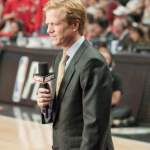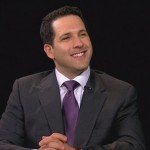Two weeks ago I read a column by Jason Whitlock and it got my wheels spinning. The outspoken columnist who recently left ESPN and returned to Fox Sports stated that we were witnessing the decay of journalism in sports media, and numerous media companies were guilty of allowing it to happen.
Much like any written piece, there were areas that could be disputed, but in general, I felt he raised a number of valid points. There’s no question that the public has a big appetite for sports information. Social media outlets like Twitter and Facebook have increased the interest, speed, and accountability for quality reporting, and most of the content produced on sports radio, television, and websites, is built from it.

Today, people are often thrust into roles they’re not ready for or they’re asked to perform multiple jobs inside of an organization because of limited budgets. That makes it harder to gain deeper penetration on a local beat, and become your very best.
Newspaper readership and advertising dollars have declined, and the radio and television industries have experienced similar difficulties. Those issues unfortunately have caused groups to reduce or eliminate these positions and limit the amount invested in them. For someone who is young, hungry, and looking to create a career as a reporter, it can be disheartening.
Over the years I’ve conducted numerous research projects, and I’ve learned that audiences prefer truth over entertainment. There is a need for both presentations but without experienced reporters investing time in developing sources, and working tirelessly to investigate stories so our demand for accurate information is satisfied, the need for sports content becomes less important.

There will always be a fraction of the audience who just want to be entertained, and don’t care to know the truth and will accept certain issues being swept under the rug (MLB Steroids scandal). Most though who watch, listen, and read about sports, want to believe that the results being achieved are honest, and we put our trust in reporters to make sure they are. Nobody has more to gain or lose, than the reporter who’s right in the middle of each story.
If there’s another growing concern, it’s that in many cases, professional sports leagues, agents, and teams have made a reporter’s job even more difficult. For example, the Redskins are notorious for trying to cover up information and present details which can only be viewed through rose-colored glasses. The Packers also recently tried to intimidate a reporter who had published an article about a player with a checkered past.
And those aren’t the only two. There are many others who operate the same way. That unfortunately makes it even tougher to trust those who do conduct themselves properly.

While a reporter may not have their name on the marquee of the show you tune into, many times it’s their information and content that dominates the majority of the programming.
The real question facing media groups is “how can the increased demand for breaking sports news across multiple platforms be utilized to generate even larger profits, pageviews and ratings“? Measuring the impact is becoming much more difficult for media operators, but there’s certainly no shortage of interest in the information.
I was curious about the benefits and challenges of reporting, and what it takes to succeed in the field, and figured that if I’m going to write a piece on one of the most important roles in our industry, I might as well ask the best.
In addition to each of these gentlemen being great at what they do, they’re also quality people, who love their profession, and have no issues sharing feedback that will help others inside the industry. If reporting is an area of interest to you, I encourage you to follow each of them on social media, and heed their advice.
- Adam Schefter – ESPN NFL Insider
- John Clayton – ESPN.com Senior NFL Writer
- Ric Bucher – Bleacher Report Senior Writer/Video Analyst; SiriusXM Radio Host
- Ken Rosenthal – Fox MLB Reporter/Senior Baseball Writer; MLB Network Insider
Q: What do you enjoy the most and least about reporting?
Rosenthal: Being the first to tell fans something they want to know is what I enjoy most. NOT being the first is the thing I enjoy least!
Schefter: There’s nothing like the adrenaline of a big, breaking news story. I love big stories, and would think all journalists do. It’s the equivalent of a big game. Do athletes feel the adrenaline and anxiety of a playoff matchup or championship game? Absolutely. It’s the same thing in journalism. There’s nothing like a big story. As for the least appealing part of the job, you never want to get beat on one of those big stories.

Clayton: The challenge of getting the information and getting the information correctly reported. Social media has made the pace of information increase, which is good. The more information the better. What this is leading to is being able to analyze the information and put it in perspective quickly.
Q: How difficult is it to establish yourself on a local level, and how did you build your brand and earn trust locally when you didn’t have a national outlet behind you?
Schefter: That’s not really how I thought about it then, or now. I just tried to do my job as well as I could ever day, treat people as fairly as I could every day, work as hard as I could every day, and wherever that went, it went. If you do those things — act professionally, report responsibly, treat people fairly — that’s how you earn trust and build your brand. They are simple things, but they are harder to follow through and carry out.

Rosenthal: I had a different job at the local level for many years – I was a general sports columnist for the Baltimore Sun. I did a lot of baseball, though, and my initial contacts when I went to the national level were mostly people who had worked for the Orioles.
Bucher: I don’t think it matters who you’re attached to. It depends on the strength of your relationships. Are you fair? Are you thorough? Do you do your homework? And, finally, do you have knowledge or insight that might be useful to the people from whom you’re seeking knowledge or insight? Working for a big enterprise might get your calls returned, or returned faster, but what they’re willing to tell you, and whether or not they’re simply using you because of your platform — and perhaps not giving you the most accurate assessment of what’s going on — still depends on how much they trust and respect you and your work.
Q: When your sport is at its peak level of activity, what does a day’s work include? How many hours are put in, and how do you balance sleep and family commitments with the job?
Bucher: I never can be sure when my sport is going to peak, because I never know when I might stumble upon something that then requires my complete focus. Or perhaps I have a project to complete and therefore need to shut out everything else; that happens, too. But let’s say we’re talking about the traditional peak activity, which is at the trade deadline, the week before the draft and the start of free agency. Generally, everything gets put on the back burner or has the potential to be put on hold for several days during those periods. The key, though, is doing your work early — knowing what potentially could be brewing weeks or months in advance and staying on top of those situations as the witching hour approaches.
When I was in full-reporter mode, everything came second. I am fortunate that I now get to spend a good part of my energy creating unique content or seeking certain stories to report out, as opposed to being subject to chasing down whatever may be going on in the league at any given moment. When that was the case, I was either making calls or thinking about who I needed to reach, and when the ideal time to contact them would be.

Clayton: The job is pretty much a 12-to-15 hour marathon. You start by making a to-do list at around 5 or 6 in the morning. You work until dinner if not later. The longer you work, the better it is. Because of that, it is difficult on family commitments and sleep. I am lucky because I have an understanding wife. That is important.
Schefter: Every day is different in this job. The regular season — September through January — has a certain rhythm to it, predictability. I can tell you what any Sunday, Monday, Tuesday, Wednesday, Thursday, Friday or Saturday will be like, and the things I have to get done. It’s the other parts of the year that are more unpredictable and challenging, because you never know when news will be coming. It could happen any time, any day, with any team or player.
There are certain times of the year that truly are peak news periods, where the work never really stops. The few weeks after the regular season ends, when teams are firing and hiring coaches while the NFL playoffs are kicking off; that’s really busy. The week leading up to and then the first couple of weeks of free agency also are non-stop, with calls coming in and going out, and news constantly happening. The two weeks leading up to the draft and the week of the draft also are heavy phone call times, with lots of speculation and questions.
Q: How hard is it to decipher between a real piece of information that has legs, and when an individual or organization are trying to utilize you and your platform to further their own agenda?
Clayton: You enter every interview knowing you’re being used. No one would be talking to you if that person wasn’t trying to present a story from their perspective. There is nothing wrong with that. You just have to recognize what angle that person is coming from.

Bucher: I’m not the first to say it, but I wholeheartedly believe it: any reporter worth their salt has a hair-trigger bullshit detector and is a bit of a cynic when it comes to sources and news. That said, sometimes you can’t tell right away if something is on the level or not. Sometimes you can go pretty far down the road and discover that the hot item you had really isn’t that hot. What is disturbing in today’s world of reporting is that finding out an item isn’t as solid as it initially appeared to be doesn’t seem to be a deterrent to putting it out there anyway as “news.” Or maybe it’s that the vetting process, the digging further to see if this juicy item truly is both juicy and an item, just isn’t a de facto part of the process anymore.
Rosenthal: It’s not always easy, but part of our job is to figure out when we’re being used.
Q: What was the one story you got burned on that still stings? What did you learn from it?
Clayton: There isn’t one that comes directly to mind. You learn from every story you do.
Rosenthal: There are too many to mention! And I’m not kidding. I remember the failures more than the successes. Just my nature, I guess.

On SportsCenter shortly before training camp opened, I reported what I knew and at the end was asked by Neil Everett, if I thought Kobe would show up for camp. I had been told by an unimpeachable source that he did not intend to show up. So I said, “I don’t think he’s showing up“. Now, that was my opinion, not something I considered on the level of reporting because even if I had been told that, there was no way I could certifiably KNOW that. But that’s how I viewed it, not necessarily how viewers heard it. So, of course, he shows up and I get killed for reporting that he wouldn’t. If I had it to do over again, I would’ve told Neil, “I don’t know what he’s going to do.”
The other one involves a colossal game of catfish, in which someone got the phone of an NBA executive and texted me from it about a trade that could be going down between the Raptors and the Heat involving Kyle Lowry and Chris Bosh. My bullshit detector was buzzing, but I spent three days texting back and forth with the alleged executive, asking questions, trying to poke holes in what they were telling me. Finally, my secret texter said the deal was about to pop and I should be good to go with it. I can’t recall ever reporting a story having talked to only one source, but this executive surely would’ve had a direct line to the information and we had spent three days going back and forth. I didn’t want to expose my source by calling someone else in the organization to ask about the deal — or so I told myself — and finally sent the story.
As soon as I did, the thought hit me — our conversation had only been by text. We’d never spoken. What if? It only took minutes before I received a call from one of the GMs involved who I knew well and who promptly told me the deal was bogus. I felt as if someone had shotgunned my guts. The same evil being then texted me again offering me the Jason-Kidd-forcing-out-John-Hammond story to “make it up to me.” That’s one sick individual.
What would I have done different? What I do now — I never report anything strictly off one source. It’s how I long operated but I’m once more committed to it fully.
Schefter: Sometimes you’re awaiting one final confirmation from a source when a story breaks. That’s never enjoyable. But it’s one of the issues of today. You need to be as fast as possible, yet you better make sure your reporting is right first. That’s the most important thing. But that’s the pressure that every reporter deals with on his or her beat. Be fast. But more important, be right.
Q: What advice would you pass along to someone who is pursuing the path of a reporter, or has just started on the local level and is trying to make inroads?
Rosenthal: Work hard, read a lot, be respectful – and be patient.

Clayton: Start as young as you can. I was credentialed to cover the Steelers when I was 17. The jobs of the future aren’t yet created. You have to create the jobs, but there are plenty of opportunities. You have newspapers, magazines, radio, television, internet and blogs. If you work hard and are accurate, you should be fine.
Bucher: Be honest. Do your homework. Cover a subject or beat as you would want to be covered. If you want your subjects to confide in you, then you have to let them get to know who you are and how you work. Don’t worry about how big the beat is or the size of the stories you’re assigned; you never know when a small story is going to become a big one. In the meantime, you get to practice on reporting out small stories so when a big one does come along you’re more apt to handle it correctly.
Spend as much time talking with the notebook closed and the tape recorder off as you do with them open and on. I still believe most people will accept the truth being told. They may not like it, they may prefer it be kept quiet, but if it does come to light and it is presented fairly they ultimately will come to understand that it needed to be told.

Jason Barrett is the President and Founder of Barrett Media since the company was created in September 2015. Prior to its arrival, JB served as a sports radio programmer, launching brands such as 95.7 The Game in San Francisco, and 101 ESPN in St. Louis. He also spent time programming SportsTalk 950 in Philadelphia, 590 The Fan KFNS in St. Louis, and ESPN 1340/1390 in Poughkeepsie, NY. Jason also worked on-air and behind the scenes in local radio at 101.5 WPDH, WTBQ 1110AM, and WPYX 106.5. He also spent two years on the national stage, producing radio shows for ESPN Radio in Bristol, CT. Among them included the Dan Patrick Show, and GameNight.
You can find JB on Twitter @SportsRadioPD. He’s also reachable by email at Jason@BarrettMedia.com.






